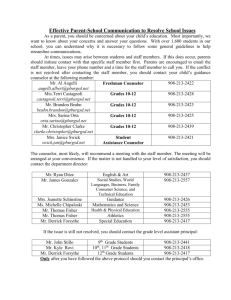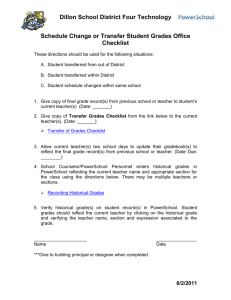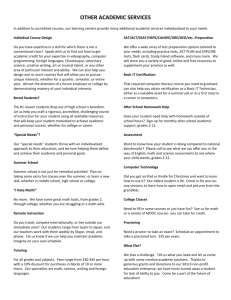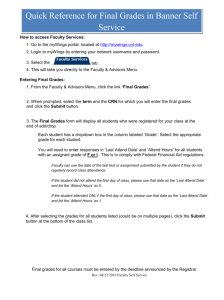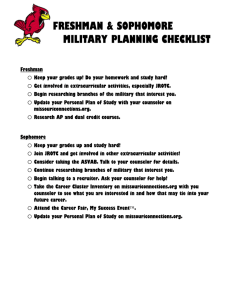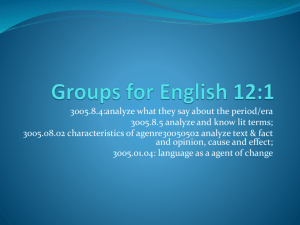Organization and Time Manangement_Naaktgeboren_Stephanie
advertisement
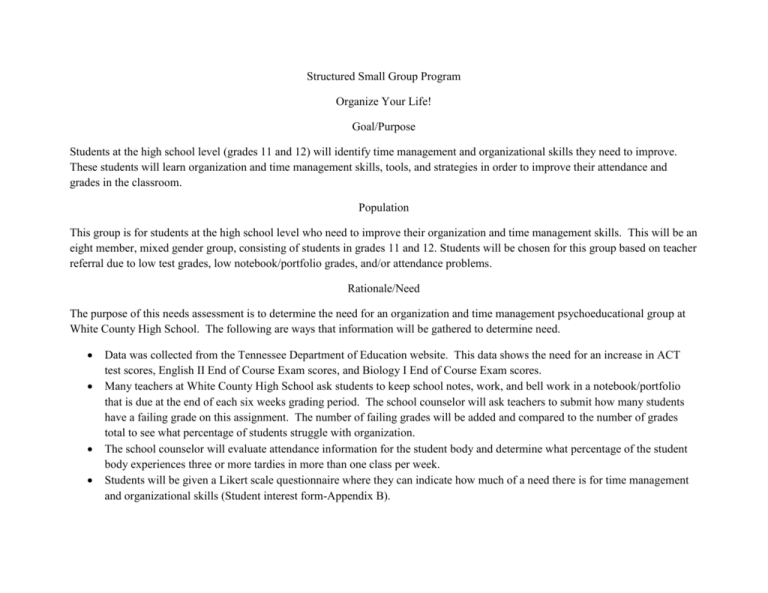
Structured Small Group Program Organize Your Life! Goal/Purpose Students at the high school level (grades 11 and 12) will identify time management and organizational skills they need to improve. These students will learn organization and time management skills, tools, and strategies in order to improve their attendance and grades in the classroom. Population This group is for students at the high school level who need to improve their organization and time management skills. This will be an eight member, mixed gender group, consisting of students in grades 11 and 12. Students will be chosen for this group based on teacher referral due to low test grades, low notebook/portfolio grades, and/or attendance problems. Rationale/Need The purpose of this needs assessment is to determine the need for an organization and time management psychoeducational group at White County High School. The following are ways that information will be gathered to determine need. Data was collected from the Tennessee Department of Education website. This data shows the need for an increase in ACT test scores, English II End of Course Exam scores, and Biology I End of Course Exam scores. Many teachers at White County High School ask students to keep school notes, work, and bell work in a notebook/portfolio that is due at the end of each six weeks grading period. The school counselor will ask teachers to submit how many students have a failing grade on this assignment. The number of failing grades will be added and compared to the number of grades total to see what percentage of students struggle with organization. The school counselor will evaluate attendance information for the student body and determine what percentage of the student body experiences three or more tardies in more than one class per week. Students will be given a Likert scale questionnaire where they can indicate how much of a need there is for time management and organizational skills (Student interest form-Appendix B). Theoretical Orientation This psychoeducational group will focus on improving adolescent skills in time management and organization. The solution-focused brief therapy approach will be used with these students because of their age, maturity level, and the desired outcome of this group. According to Gerald Corey (2012), using the solution-focused approach is effective in the school setting because it “helps students develop positive goals rather than negative ‘stop doing it’ goals” and “it emphasizes ‘what works’ rather than ‘why’ something is a problem. (p. 438). Ethical, Legal, and Multicultural Issues The students who make up this group will be adolescents, so legal issues apply. All students will be required to have parents or guardians sign a consent form (Appendix C) in order to take part in this skill building group. Although most of the time in group will be spent on discussing and practicing strategies for improving time management and organizational skills, the concept of confidentiality in the group setting will be discussed and enforced. The group leader will protect against psychological harm through various counseling techniques. In addition, all cultural issues will be taken into account during the initial screening procedures and during group work. During the pre-group interview the school counselor will discuss cultural differences and if needed, the group leader will adjust for all cultural differences. Recruitment and Screening Prior to the formation of the organization and time management group, the school counselor will ask for teacher referrals (Appendix A) of students who are at-risk due to their lack of organization and time management skills (shown through low classwork and test grades, low notebook/portfolio grades, and/or excessive tardies/absences). Once students have been referred, the school counselor will screen potential group members through a pre-group interview. Following the interview, the school counselor will ask students to participate in a pre-session to further determine group fit. Structure This psychoeducational group is a six session closed group that will meet once a week for six weeks. This group will be offered once a semester and will meet in the virtual lab. The group will take place during B.U.G. (Bring up Grades) time and the first part of fourth block from 1 – 2 pm on Tuesdays. This group will begin meeting each semester at the beginning of the second six weeks after students have received their first report card of the semester. Core ASCA Standards AA:1.5 Identify attitudes and behaviors leading to successful learning. A:A2.1 Apply time-management and task-management skills A:A2.2 Demonstrate how effort and persistence positively affect learning A:B1.1 Demonstrate the motivation to achieve individual potential A:B1.7 Become a self-directed and independent learner A:C1.1 Demonstrate the ability to balance school, studies, extracurricular activities, leisure time and family life C:A1.7 Understand the importance of planning C:A1.10 Balance between work and leisure time Core State Academic Standards Tennessee Curriculum Standards English CLE 3005.2.7 Participate in work teams and group discussions. CLE 3005.2.1 Demonstrate critical listening skills essential for comprehension, evaluation, problem solving, and task completion. 3001.3.14 Generate notes while collecting information, following a logical note-taking system. United States History 10.1.0 Recognize how the scientific and technological advances of the computer age influenced American culture. Science CLE 3216.T/E.1 Explore the impact of technology on social, political, and economic systems. Objectives Students will discuss educational and life problems related to a lack of organization Students will discuss educational and life problems related to a lack of time management Students will bring up grades using new organizational and time management skills. Students will use a three-ring binder to organize papers, assignments, and handouts for each subject (Bakunas &Holley, 2004). Students will learn how to take and organize notes (Bakunas &Holley, 2004). In their agenda, students will write down assignments for every class daily (Bakunas &Holley, 2004). Students will break down large assignments into smaller parts and complete the assignments in a timely fashion (Bakunas &Holley, 2004). Students will develop a study plan to learn how to prepare for a test (Bakunas &Holley, 2004). Students will learn to use a cell phone, smartphone, tablet, or online organizer to manage their schedule. Program Evaluation During the first session, students will complete a pre-test for all sessions and at the termination session they will complete a post-test (Appendix B). At the beginning of each group session, students will complete a pre assessment and at the end of each session, students will complete a post assessment. In addition, at the end of each of the organization and time management sessions, the school counselor will have students complete a form that reviews the topics covered during the session and the homework assignment (group session follow up form - Appendix E). Following the completion of the six-week psychoeducational program, the school counselor will interview each student (follow up interview form - Appendix F), give each teacher that referred a student an evaluation form (Appendix G), send a parent evaluation form home (Appendix H and I), and ask students to complete an evaluation form (appendix J). Following the termination of the organization and time management group, the school counselor will collect data on classwork and test grades, notebook/portfolio grades, and attendance information and compare it to the data collected before the group began. The school counselor will calculate this data to determine the outcome of the organization and time management group. Session 2 Title: Organize Your Life! Brief Summary of Session: Students will discuss problems with organization and time management that affects their classroom work, attendance and grades. Theoretical Orientation: This psychoeducational group will use solution-focused brief therapy in groups. Specific Group Technique: Modeling, rounds, active listening, initiation, goal-setting, and linking. Duration: 60 minutes Materials/ Media: Pre/post-test, poster board, marker, “own” work worksheet. Core ASCA Standard(s): AA:1.5 Identify attitudes and behaviors leading to successful learning. A:B1.1 Demonstrate the motivation to achieve individual potential Core State Academic Standard(s): English: CLE 3005.2.7 Participate in work teams and group discussions. CLE 3005.2.1 Demonstrate critical listening skills essential for comprehension, evaluation, problem solving, and task completion. Objectives: Students will create definitions for organization and time management. Students will create examples of organizational problems and time management problems. Students will discuss and evaluate educational and life problems related to a lack of organization. Students will discuss and evaluate educational and life problems related to a lack of time management. Assessments: This assessment is a pre/post-test that focuses on the four objectives (Appendix L). Procedures/ Instructional Strategy: Ice breaker game – each student will pick a question from the cup and answer it. The group leader will remind students of the topic and introduce the session objectives. Review the purpose and goals for the group, as well as the guidelines for the group. Pre-test The leader and group members will clarify the meaning of organization and the meaning of time management. The group leader will use a poster board and marker as students create a working definition of each on the poster board. On the poster board, the students will list issues/problems related to time management and organization. Using rounds, each group member will choose a situation from the poster or choose something they have experienced personally and describe the situation. They will analyze the situation and their thinking. Other group members can respond to the situation or feelings. The group will discuss ways to change thinking and behavior. Closure – “Based on something you have said or heard here today, tell us one issue that really stuck out to you and you feel you can work on.” Post-test “Own” work: Students will be given a homework assignment to track their goal over the next week. They will fill in a chart to determine what they are doing each day to meet their goal. At the end of the form they will be asked to evaluate the information they wrote in their chart. (Appendix K). In addition, students will complete the session follow-up form (Appendix E). Group Stage and Emerging Issues: This group session will operate in the initial stage, and because of this some issues can arise. For instance, students may not yet be comfortable enough to share their thoughts or feelings in front of everyone else. Session 3 Title: Organize Your Life! Duration: 60 Minutes Brief Summary of Session: Students will learn strategies to help improve their time management and organizational skills. Theoretical Orientation: Solution-focused brief therapy in a psychoeducational group Specific Group Technique: Modeling, behavior rehearsal, coaching, questioning Materials/ Media: Three-ring binder, dividers, pen/pencils, agendas, notecards, markers Core ASCA Standard(s): AA:1.5 Identify attitudes and behaviors leading to successful learning. A:A2.1 Apply time-management and task-management skills A:A2.2 Demonstrate how effort and persistence positively affect learning A:B1.1 Demonstrate the motivation to achieve individual potential A:B1.7 Become a self-directed and independent learner A:C1.1 Demonstrate the ability to balance school, studies, extracurricular activities, leisure time and family life C:A1.7 Understand the importance of planning C:A1.10 Balance between work and leisure time Core State Academic Standard(s): English CLE 3005.2.7 Participate in work teams and group discussions. CLE 3005.2.1 Demonstrate critical listening skills essential for comprehension, evaluation, problem solving, and task completion. 3001.3.14 Generate notes while collecting information, following a logical note-taking system. Objectives: Students will bring up grades using new organizational and time management skills. Students will use a three-ring binder to organize papers, assignments, and handouts for each subject (Bakunas &Holley, 2004). In their agenda, students will write down assignments for every class daily (Bakunas &Holley, 2004). Assessments: This assessment is a pre/post-test that focuses on the three objectives (Appendix N). Procedures/ Instructional Strategy: Using a notecard and a marker, write what an ideal day would look like for you (show students how organization/time management connects to their ideal day). Review topic Share one success of the last week related to organization and time management. Review homework Pre-test Students will work together to learn (through modeling) and create organized, divided three-ring binders for their classes. Each student will bring their agenda. They will learn (through modeling) how to use their agenda’s calendar to organize their assignment due dates and obligations. Students will discuss how using a more organized system for their work and assignments can affect their grades. Closure – What value does being organized have in your life? Post-test Homework/ Ownwork: Choose an organization or time management goal to complete by next week. Write a sentence describing your goal, a sentence describing how you will meet this goal, and two sentences describing how you met this goal. Group Stage and Emerging Issues: This group session will operate in the working stage. If the group is missing “cohesion, trust, a willingness to take risks, a commitment to work towards goals” it is not functioning as it should (Erford, 2010, p 143) References American School Counselor Association (2004). ASCA National Standards for Students. Alexandria, VA: Author. Bakunas, B., & Holley, W. (2004). Teaching Organizational Skills. The Clearing House, 77(3), 92-95. Corey, G. (2012). Theory & Practice of Group Counseling. (8th ed.). United States: Brooks/Cole, Cengage Learning. Erford, B. T. (2010). Group Work in the Schools. (1st ed.). Boston, MA: Pearson. Icebreakers for Small Groups. (n.d.). Buzzle.com: Intelligent Life on the Web. Retrieved June 5, 2012, from http://www.buzzle.com/articles/ice-breakers-for-small-groups.html Missouri Comprehensive Guidance Programs (2009, April 13). Responsive Services: Small Group Counseling Module. Missouri Center for Career Education. Retrieved 27, 2012, from http://www.missouricareereducation.org/doc/smallgroup/SmallGroupCounseling.pdf Tennessee Department of Education (2009). English. Curriculum Standards. Retrieved June 5, 2012, from http://www.tn.gov/education/ci/english/doc/ENG_3005.pdf Tennessee Department of Education (2009). United States History. Curriculum Standards. Retrieved June 5, 2012, from http://www.tn.gov/education/ci/ss/doc/SS_3405.pdf Tennessee Department of Education (2009). Biology. Curriculum Standards. Retrieved June 5, 2012, from http://www.tn.gov/education/ci/sci/doc/SCI_3216.pdf


